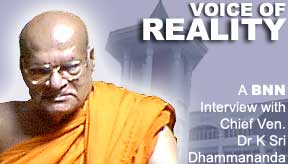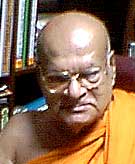Spiritual Teabreak
with Chief Ven. Dr K Sri Dhammananda
 Kuala
Lumpur
Kuala
Lumpur
This spiritual tea break session is
brought to you exclusively by the Buddhist News Network. Spiritual teabreak is a monthly
series bringing to you thoughts of Chief Ven. Dhammananda via the Internet.
"Women have
already become presidents of countries. Why can't they become nuns?!"
Those words came
out softly, but the tone was firm. Chief Venerable Dr K Sri Dhammananda was not about to
be polite this morning. The Maha Vihara complex today looked pale against a backdrop of
gloom and grey. The day have begun on a wet note, with heavy showers making its presence
felt well before dawn.
Chief was
commenting on a series of articles which highlighted Thai nuns leaving their home country
for Sri Lanka so that they could be ordained.
According to a
Bangkok Post report on July 5, 2001 Jamnian Rattaburi became only the second Thai woman to
seek ordination. The first was Buddhist scholar Chatsumarn Kabilsingh, and it has brought
her under fierce attack by conservative Thai monks and laypeople. Chatsumarn, now samaneri
Dhammananda, will become a full bhikkhuni after completing her two-year novicehood.
"Instead of
advancing efforts to enhance understanding of the Dhamma, and extoling courage to control
their minds, some Buddhists seem to be held back by outdated traditions and beliefs",
explained the 82 year old venerable. "And we shouldn't blame others for saying
Buddhism is backwards because we have not helped ourselves to be forward thinking."
Having born early
in the last century, it is hard to believe that his thinking and mental outlook remain
extremely realistic, pragmatic and relevant. Modern even. An embodiment of the timeless
Dhamma perhaps, but it does say something about his ability to view contemporary issues
effecting the Sangha in ways which is uncommon for members of the Buddhist clerics.
"Two months
ago, at the doctorate award ceremony at the Mahachulalongkorn University, I gave a short
speech to about 5,000 graduate monks", his tone mellowed as he began to emphasise his
key point. "I said, other religion always say that the Buddha is not a god, but a
man. So why do we Buddhist worship him? How can He bless us? Save us? They say all we
worship are just idols. Now how can we counter such questions?"
He has a point.
Most monks today tend to deliver mostly "book knowledge". But how many teaches
their followers to face the challenges of the modern world? It is not just religious
knowledge that matters, but as he says "the courage to learn how to control our own
minds, so that we are not timid or scared in facing any difficulties." And then he
sounded the clarion call:
"If we know
what is right, there is no reason to surrender."
In not so many
words, Chief highlighted what plagues the Dhammaduta (Buddhist missionary) movements all
over the world. In embracing the tenets of the Dhamma, devout Buddhists have turned it
into an "exclusive" religion, not realising that the Dhamma is not a dogma,
maxim, doctrine, theocratic philosophy or any connotations that suggests the "closing
of the mind."
 |
| "If we know what is
right, there is no reason to surrender." |
|
|
Book knowledge undeciphered remain just that - theoretical information
which contains high sounding words but brings only fuzzy meanings. That is why the Buddha
skillfully engaged the usage of metaphors to deliver his message. As Chief explains,
"during the Buddha's time, education was low and rural farming was a way of life.
Given the environment as such, using stories to convey a certain discourse was the most
effective method at that time." And he certainly demonstrated what he meant when he
delivered this story. |
"All religion
teaches peace, harmony and friendship. They always talk about love, but they always find
it difficult to love one another. Instead they condemm each other, treating the other
party like a disease."
"One
day," he continued, "our neighbour (i.e. the church just beside the vihara)
wanted to organise a Christian seminar. But they had a problem. They didn't have enough
place to stay for their delegates. They came to see me and asked if I could help. I said
'yes', your delegates can use the vihara classrooms as guests' accomodation for the
duration of the seminar."
As the analogy
goes, it doesn't matter if it is Indian sandals or Chinese clogs or American shoes, as
long as it fits, just wear it. When it comes to matching deeds with words, there is no
shortage of examples to showcase the depth of wisdom of this highly revered Venerable.
But the examples
doesn't stop here. The next story he told was well known amongst those who were involved
in establishing Buddhist hymms way back in the early eighties. For some, it even bordered
on legendary scales.
"When Victor
(Wee) and the Wayfarers came to see me about their wish to commence a hymm singing group,
I gave them my blessings. But when they first began singing their first hymm, the orthodox
elders and some members of the Sangha made a lot of noise, saying that the group was
turning the vihara into a church," he reminisced. "But I stood my ground. I
said, let them say what they want. If you think you are right, just go ahead."
A few years later,
those simple Dhamma based hymms inspired a whole new generation of young, committed
Buddhists. It also became impetus in re-igniting and rejuvenating the Buddhist youth
movements all over Malaysia.
As the morning wore
on, it became apparent that the sun was not going to be shining brightly. The overcast
skies and the soft drizzle continue to contribute to a damp and soggy atmosphere. But
that's outside.
Inside, in here,
right here in the seat of this "Mahathera", the glow of Dhamma was shining
brightly. The glory of the saffron robe was brightly inflamed with deep wisdom. The heat
of compassion from this Venerable was giving warmth to future hopes.
And therein lies
the message of today's morning teabreak:
Buddhists need to
break out from their conservative shell. As we learn, we should also not close the minds
to the fluid happenings of the world around us. Whether be it women seeking to become
nuns, whether emphatising with other religionists "so that they could understand
their religion better", whether encouraging youngsters to explore new ways to promote
Buddhism, Buddhist growth can only happen with an open mind.
Let us all hope
that Chief's morning teabreak message will reverbrate loud and clear through this grey and
gloomy morning. And it'll only be to our benefit, for if we Buddhists know we are right,
there is no reason to surrender.